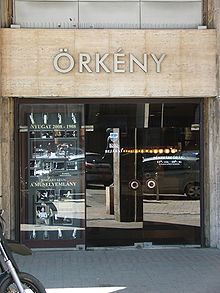István Örkény
István Örkény (born April 5, 1912 in Budapest , Austria-Hungary , † June 24, 1979 there ) was a Hungarian writer and playwright .
Life
Örkény was born in Budapest in 1912 as the son of a pharmacist . After graduating from school, he studied applied chemistry and then switched to pharmacy . He graduated from this degree in 1934. After a few years abroad (including Paris and London), he returned to Hungary in 1940, where he also completed his chemical engineering studies.
In 1942 he was drafted as a Jew and had to serve in a labor battalion on the Russian front during the war. In 1946 he returned to Budapest, where he began to write. His short story Violet Ink was attacked and criticized by the socialist ideologist József Révai . He was banned from writing in the mid-1950s. When the revolution finally broke out in Hungary , he criticized the Hungarian radio with the following statement: "We lied during the day, we lied at night, we lied on every wavelength". Together with other writers such as Déry, Gyula Illyés , László Benjámin and Zoltán Zelk, he then applied for asylum in the Polish embassy, but the asylum application was rejected. When the Soviet Russians finally put down the uprising, he and five colleagues published a self-critical pamphlet to cover up their activities during the uprising. Nevertheless, he was banned from writing in 1957. In 1960 this was finally repealed and it was able to gain recognition.
In 2004 the former Little Madách Theater ( Madách Kamara) in Budapest was named after István Örkény (Örkény Színház).
plant
The best-known works by Örkény are his minute novellas (Hungarian Egyperces novellák ). With these he founded a new genre in literature. The minute novels were actually created as relaxation exercises during his work on the novels. Reading them takes a minute at most, which is why they seem to be made for today's modern and fast-moving times. In his short stories Örkény describes the everyday, the banal, but regularly leads it into the absurd. At the same time, the reader is challenged to think further, as the minute novellas often have an open ending that encourages the story to continue. A first installment of these over 400 minute novels was published in 1967. Other important works are the novel Married couple (1956), Princess of Jerusalem (1966), the Tót family (1967), an absurd drama, Blood Relatives (1975) and the tragicomedy Katzen-Spiel . His novel Das Lagervolk was first published in German in 2010 (the original Hungarian edition in 1947). The author himself describes it as the "sociography of the prisoner-of-war camp" (his Soviet captivity lasted from 1943 to 1946). According to the blurb, the novel is the “material from experience” for his “minute novels”.
Works (selection)
- Istvan Örkény: Interview with a dead person . Novel. Translated from the Hungarian by Hildegard Grosche , Suhrkamp, 1st edition, Frankfurt am Main 1982, ISBN 3-518-37337-4
- István Örkény: The camp people . Novel. With an afterword by Imre Kertész. From the Hungarian. trans. u. annotated by Laszlo Kornitzer , Suhrkamp, Berlin 2010, ISBN 978-3-518-42079-9
Web links
- Literature by and about István Örkény in the catalog of the German National Library
- Works by and about István Örkény in the German Digital Library
swell
- http://www.rev.hu/history_of_56/szerviz/kislex/biograf/orkeny.htm
- http://www.suhrkamp.de/autoren/autor.cfm?id=3598
- http://www.lyrikwelt.de/rezensions/minutennovellen-r.htm
- Brockhaus Encyclopedia 1991 Nineteenth Edition, Volume 16, p. 274
| personal data | |
|---|---|
| SURNAME | Örkény, István |
| BRIEF DESCRIPTION | Hungarian writer and playwright |
| DATE OF BIRTH | April 5, 1912 |
| PLACE OF BIRTH | Budapest |
| DATE OF DEATH | June 24, 1979 |
| Place of death | Budapest |


